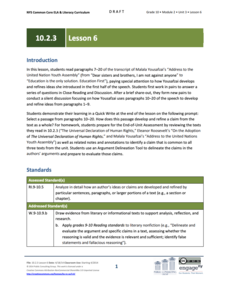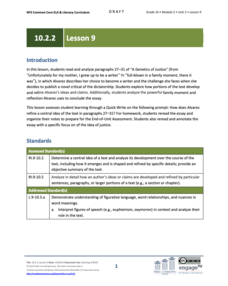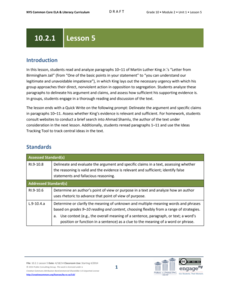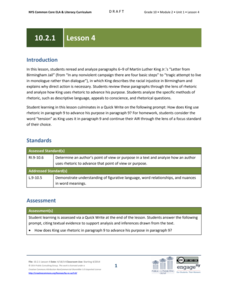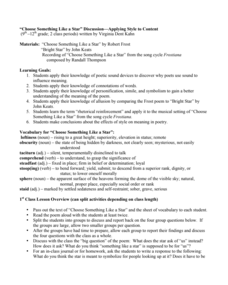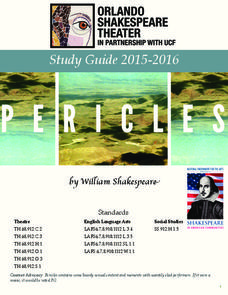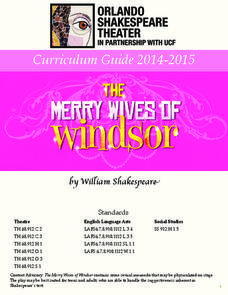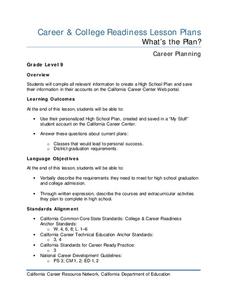EngageNY
Grade 10 ELA Module 3: Unit 1, Lesson 11
Have you had a change of heart? Scholars consider whether their views change after gaining new information about tissue ownership. They read John Moore's court hearings and respond to a quick write prompt, noting if the new information...
EngageNY
Grade 10 ELA Module 2: Unit 3, Lesson 6
Let children be children. Scholars read in a speech by Malala Yousafzai how childhood is absent as children are forced to work and get married at a young age. Learners analyze part of the speech and discuss it in groups. After sharing...
EngageNY
Grade 10 ELA Module 2: Unit 2, Lesson 9
How do authors develop the main ideas in their writing? Pupils consider the question as they read and analyze paragraphs 27–31 from Julia Alvarez's essay "A Genetics of Justice," in which Alvarez describes her decision to become a...
EngageNY
Grade 10 ELA Module 2: Unit 3, Lesson 4
It is, and it is not. Scholars examine how these words impact Eleanor Roosevelt's speech, in which she tries to persuade the adoption of the Universal Declaration of Human Rights. Readers note rhetoric and figurative language. They then...
EngageNY
Grade 10 ELA Module 2: Unit 1, Lesson 19
Great minds think alike. Scholars read two texts and compare how the authors develop the same central idea. Readers analyze "Women" by Alice Walker and "Letter from Birmingham Jail" by Martin Luther King Jr. They discuss word use and new...
EngageNY
Grade 10 ELA Module 2: Unit 1, Lesson 5
People should always choose their words carefully. Scholars examine the words used by Martin Luther King, Jr. in paragraphs 10 and 11 of his "Letter from Birmingham Jail." Readers answer questions about word use, think about synonyms,...
EngageNY
Grade 10 ELA Module 2: Unit 1, Lesson 4
Just read between the lines. Scholars analyze rhetorical devices in Martin Luther King Jr.'s letter by first discussing them with guided questioning. They then complete a rhetorical impact tracking tool before finishing the lesson plan...
EngageNY
Grade 10 ELA Module 2: Unit 1, Lesson 14
Let's see how the story unfolds. Scholars examine paragraphs of Martin Luther King Jr.'s "Letter from Birmingham Jail" to determine how King unfolds his analysis of the church. Before arriving at an answer, learners work in pairs and...
EngageNY
Grade 10 ELA Module 2: Unit 1, Lesson 13
Freedom is not free. Scholars write to a prompt analyzing two pieces of work that develop ideas about freedom. Readers compare “Freedom” by Rabindranath Tagore and "Letter from Birmingham Jail" by Martin Luther King Jr. Learners work...
EngageNY
Grade 10 ELA Module 2: Unit 1, Lesson 6
Readers determine if this statement applies when comparing the central idea of Ahmad Shamlu's "A Blind Alley" and Martin Luther King Jr's "Letter From Birmingham Jail." Learners analyze the standard related to the central message, listen...
EngageNY
Grade 10 ELA Module 2: Unit 1, Lesson 2
Help readers go deeper and gain an understanding of purpose and justification while analyzing a letter written by Martin Luther King, Jr. Literature lovers discuss the letter in a variety of settings, including in pairs, groups, and...
Robert Frost Farm
“Choose Something Like a Star” Discussion—Applying Style to Content
Robert Frost's "Choose Something Like a Star" and John Keats' "Bright Star" provide the text for a two-part instructional activity in which class members analyze the effects of style on meaning in poetry. Randall Thompson's song cycle...
Benjamin Franklin Tercentenary
Franklin, Master Diplomat
While many often associate Ben Franklin with his kite electricity experiments, budding historians find out he contributed much more. They discover Franklin's political savvy by examining primary sources in the informative installment of...
Scholastic
What’s the Good Word? Etymology Project Guidelines
Who named the shapes, or the days of the week? Should words be removed from the dictionary if they're no longer commonly used? Are there too many words in the English language? Language arts students explore these and additional...
Orlando Shakes
Pericles: Study Guide
Everyone loves a great riddle, right? Everyone except for the characters in Shakespeare's Pericles, who will be killed unless they answer the king's riddle correctly. With the study guide, scholars use words coined by Shakespeare to play...
Orlando Shakes
Merry Wives of Windsor: Study Guide
What does the character Falstaff mean when he says "I was beaten myself into all the colors of the rainbow"? Using the Merry Wives of Windsor curriculum guide, scholars unlock meaning by paraphrasing lines from the play. Pupils also...
Orlando Shakes
The Taming of the Shrew: Study Guide
William Shakespeare's The Taming of the Shrew combines three things that are sure to capture scholars' attention: love, deception, and clown attire. With the curriculum guide, learners hone their opinion-writing skills and practice...
Orlando Shakes
Julius Caesar: Study Guide
What makes a good leader? Use the curriculum guide for William Shakespeare's Julius Caesar to help scholars answer that question. Pupils research the play's historical context and other background information before engaging in...
Orlando Shakes
Henry V: Study Guide
Shakespeare did more than write timeless literary works—he coined words such as moonbeam, fortune-teller, and even eyeball! A study guide for Henry V introduces key words the Bard first used with a fun vocabulary activity, part of a...
Society for Science & the Public
Easter Islanders Made Tools, Not War
When studying artifacts, especially tools, how do archaeologists determine what the devices were used for? In what ways might researchers' previous experiences influence their perception of an artifact? An article about researchers'...
California Department of Education
What’s A Hot Job?
What jobs are the next best thing? Curious career scholars explore their options in activity three of a five-part series. Pupils research job trends and labor statistics before discussing the factors that influence occupation trends.
California Department of Education
Choosing My Lifestyle
How much does it cost to live the life your dream life? Scholars explore the pitfalls of personal finance through planning, discussion, and research. The first lesson in a five-part series tasks individuals with determining an...
California Department of Education
What’s the Plan?
What classes should pupils take to achieve their college and career goals? Explore the options through a lesson designed with the future in mind. Fifth in a series of six college and career readiness lesson plans, the activity challenges...
American Press Institute
Newspapers in Your Life: What’s News Where?
Big news isn't necessarily newsworthy everywhere! How do journalists decide what to cover with so much happening around them? A instructional activity on media literacy examines the factors that affect the media's choice of stories to...



